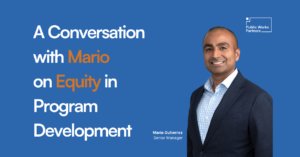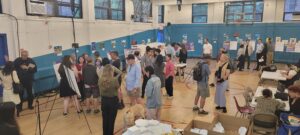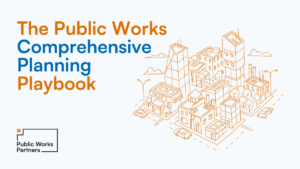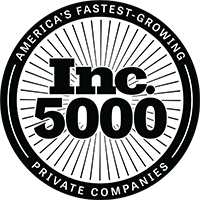Caring for the environment comes in many forms—structural and individual, obvious and hidden. While we take on projects of all shapes, sizes, and interests here at Public Works, our commitment to environmental responsibility and environmental justice runs throughout our work and company culture. We believe that a healthy environment is a core component of thriving communities, which is what we’re all about.
In order to proactively care for the environment and prepare for future environmental changes, we all must adjust to new habits, large and small, that put the earth first. Over the past few years, Public Works has taken on a variety of projects that bring together communities, planners, and government agencies to build collaborative approaches to implementing sustainable systems while setting expectations and managing change. This work is essential to building a future that is more equitable, just, and sustainable.
Traffic
Traffic is a major source of greenhouse gas emissions across the country and in NYC, in spite of the City’s world-class public transportation system. According to research from Cornell and City College of New York, about 1 million tons of greenhouse gas emissions are produced by vehicles in lower Manhattan annually. While not solely attributable to congested streets, high levels of traffic lead to more time spent in cars and trucks, and therefore more emissions. Major thoroughfares in the City must often be all things to all vehicles—loading zones to trucks, essential arteries to commuters, and pick-up and drop-off points to taxis and private drivers—leading to hectic streets that are often characterized by gridlocked traffic.
In the fall of 2019, Public Works partnered with Sam Schwartz Engineering to assess the implementation of NYC DOT’s 14th Street Busway pilot, which provides bus priority from 9th Avenue to 1st Avenue on 14th Street. The program was designed to improve M14 bus service and increase safety along the corridor, effectively decreasing congestion and promoting reliance on low-emissions transportation such as public transit, walking, and bicycling to travel across town. Public Works supported implementation of the pilot through the development and coordination of a general public survey, which assessed the perceived accessibility, convenience, and safety of the new busway. Our surveys and analysis by Sam Schwartz found that bus priority makes the 14th street bus faster and more reliable, providing dependable public transportation to all New Yorkers. Our work collected essential insights from community members to better understand the impacts of the busway and build community support for the program, which continues today.
Public Works also supports the NYC Department of Sanitation as they implement NYC’s new Commercial Waste Zones, an initiative designed to increase the efficiency and accessibility of the commercial waste collection system in the City while advancing the City’s Green New Deal and zero waste goals. Commercial waste in the City is transported by private companies, who regularly make trips across the five boroughs to collect waste from businesses who hire carters based on price, rather than proximity. The new Zones plan divides the City into 20 zones, each served by 3 carting companies selected through a competitive process. This will decrease traffic, and therefore emissions, by shortening routes and putting an end to unnecessary overlaps. The plan also increases the City’s oversight of commercial waste carters, providing for improved service and labor standards. Public Works has supported this effort through the coordination of stakeholder engagements that set community expectations for future commercial waste management experiences while developing a deeper understanding of stakeholders’ priorities for the new system, paving the way for a greener, more sustainable commercial waste management process.
Waste Management
Waste management is an unglamorous yet critical component of City operations. How we deal with our waste is also a major contributor to the City’s overall greenhouse gas emissions—according to a 2019 report from the Mayor’s Office of Sustainability, landfills produced 1.9 million metric tons of greenhouse gases. Figuring out how to reduce these emissions takes both structural innovation and personal habit change. To create sustainable solutions, these two efforts must work in tandem.
The New York City Housing Authority, which serves over 550,000 New Yorkers, wanted to optimize their waste management practices across public housing developments in order to reduce visible waste and improve residents’ quality of life. Identifying new ways to easily separate waste for recycling and organics collection, which reduces landfill-bound trash and eliminates waste collection practices that attract pests, was a core goal of this effort. To support the development of NYCHA Waste Management 2.0, Public Works designed an expansive community outreach program to identify pain points in the existing waste management system and develop community-informed recommendations for the implementation of future waste management practices. The plan lays out infrastructure improvements as well as steps that NYCHA leaders, staff, and residents must all take together to improve waste management practices.
Our work with NYCHA on the Waste Management Plan helped to lay the groundwork for future innovations that will support more sustainable practices. We also support initiatives that cultivate habit changes to better utilize programs that already exist. DSNY and their partner, Big Reuse, engaged Public Works to facilitate focus groups designed to test outreach strategies promoting resident participation in their weekly curbside organics collection program. While the program has been suspended due to budget cuts stemming from the pandemic, in 2019 the program diverted 154.3 tons of organics per day. Our work positioned DSNY and Big Reuse to further this campaign, inspiring a growing number of New Yorkers to make sustainable and ecologically responsible decisions and change deeply entrenched habits.
Green Infrastructure and Planning
While greener practices and policies were an implicit part of many of the projects described above, we also work on projects where sustainability and resiliency are the whole point. Tackling climate change head on will require large-scale innovation and significant community buy-in in. Our work connecting communities to policy makers directly supports these initiatives.
One such project is the Financial District and Seaport Climate Resilience Master Plan, which aims to promote a long-term adaptation plan for the Financial District and Seaport, two neighborhoods at substantial risk as a result of climate change and sea level rise. When Hurricane Sandy hit the City in 2012, these two neighborhoods saw significant flooding and were without power for close to two weeks, thanks in part to their low elevations and space constraints that limit opportunities for permanent land-based flood barriers. NYC EDC hopes to solve these issues through the master planning process, which will develop community- and science-supported solutions to protect the area from future flooding.
To support this effort, Public Works conducted community outreach centered on educating the community, developing avenues for two-way communication, and building support for the project. Our outreach culminated in a science fair-styled community open house that brought together planners, climate researchers, elected officials, and community members of all ages and backgrounds to explore the possibilities of the Master Plan. This outreach established a base of community support and built a collective understanding of the urgency of the climate threats facing the community. We’ve also supported community engagement efforts in Nassau County, where the Bay Park Conveyance project is being undertaken to promote coastal resiliency and improve residents’ and visitors’ quality of life.
Strengthening the organizations that strengthen communities
In addition to building relationships between community members, planners, and policy makers to advance environmental initiatives, we bring our management expertise to nonprofit organizations and City agencies committed to protecting the environment, helping them to advance their missions and increase their impact on their communities. This work includes foundational research and analysis to support future programs, the facilitation of strategic planning processes, streamlining operations, and much more. We’re proud to have supported Just Nature NYC Partnership, a collaboration between The Nature Conservancy and NYC Environmental Justice Alliance, NYC Park’s Greenthumb program, the HOPE Program’s Intervine program, and the Billion Oyster Project, among others, and look forward to new opportunities to support the organizations advocating for the health of their communities. The commitment of the federal government to addressing the causes and impacts of climate change is heartening, and we are optimistic about the innovative programs that will grow from this support.
Building support among community members and understanding the wide-ranging impacts of new systems on all stakeholders, especially those who have historically been excluded from the planning process, are essential components of developing equitable systems that will last. From program and policy development through to the final stages of implementation, Public Works is here to support the work of organizations advancing a more sustainable future.
Are you already taking on these projects? Do you have plans to take advantage of funding for green infrastructure? Let us know about how your community is working toward a more sustainable future by getting in touch at info@publicworkspartners.com, or on social media @PublicWorksIQ. We’d love to hear from you.





 Public Works Partners is a WBE/DBE-certified urban planning and consulting firm. Our expertise lies in creating innovative, equitable, and sustainable solutions to complex problems.
Public Works Partners is a WBE/DBE-certified urban planning and consulting firm. Our expertise lies in creating innovative, equitable, and sustainable solutions to complex problems.